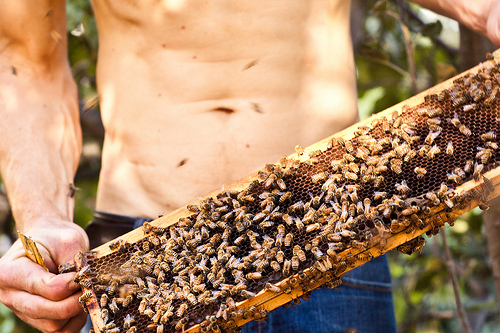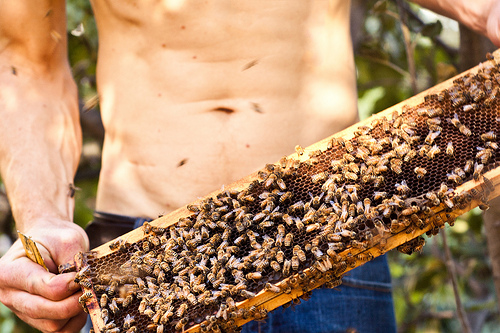 This beekeeper isn’t alone in worrying about Bayer’s pesticide.Photo: David GoehringMy problem with Matt Ridley’s recent Wall Street Journal piece on bee collapse starts — and more or less ends — with his first sentence:
This beekeeper isn’t alone in worrying about Bayer’s pesticide.Photo: David GoehringMy problem with Matt Ridley’s recent Wall Street Journal piece on bee collapse starts — and more or less ends — with his first sentence:
Some beekeepers, worried by the collapse of their bee colonies in recent years, are pointing a finger this month at a class of insecticide (neo-nicotinoids) that they think is responsible for lowering the insects’ resistance to disease.
Ridley, a veteran science journalist who calls himself the “rational optimist,” goes on to argue that it could be a virus, and not Bayer CropScience’s highly profitable neonicotinoid pesticides, that’s behind the severe trouble now haunting honeybee populations. His argument seems plausible enough; I am not an entomologist, so I cannot critique it.
I suppose, to use Ridley’s framework, listening to mere beekeepers on the state of the honeybee would be irrational. But it isn’t just “some beekeepers” who think that Bayer’s neonicotinoids might be harming the bees. As I’ve reported, EPA scientists and the USDA’s top bee specialist have independently raised serious concerns about what this class of pesticides is doing to the bees.
And in both cases, these concerns came to light not through the free dissemination of information on a key ecological issue with direct bearing on the public interest. Rather, they were raised because of a leaked document and an interview in a documentary film that has been shown in Europe but not in the United States.
In the case of the EPA, as I wrote, the agency has chosen to retain its registration of a Bayer neonicotinoid pesticide even after two of its own scientists rejected the scientific validity of a Bayer-funded lifecycle analysis that purported to show that applying the poison to farm fields was safe for bees. We only know of their concerns about the study because an EPA employee leaked a document [PDF] to Colorado beekeeper Tom Theobald. The now-discredited Bayer-funded study was central to the process of the EPA’s registration of the pesticide.
As for the USDA scientist, the lead researcher at the USDA’s Bee Research Laboratory, Jeffery Pettis, appeared in the 2010 documentary The Strange Disappearance of the Honeybees and described his own research showing that a Bayer neonicotinoid makes bees significantly more vulnerable to a harmful pathogen — even when the pesticide is present at extremely low levels.
I haven’t seen the documentary myself yet, but here is a transcript [PDF] of Pettis’ remarks in the film. I wrote about this after Mike McCarthy, environment editor of the U.K.-based Independent, broke the story in the English-speaking press. Pettis told McCarthy that he completed his research on neonicotinoids two years ago and has still not published his findings. Why Pettis’ research has not come to light remains unclear; I am looking into it.
Now, it’s quite possible that Ridley is simply unaware that beekeepers’ concerns about neonicotinoids are backed by hard evidence from U.S. government scientists. After all, the government has not seen fit to broadcast these concerns to the public, and to my knowledge, mainstream U.S. media have completely ignored my and other accounts of these stories.
But there is a thing called Google search, and it is rational to use it before opining on a topic. Ridley may be right that neonicotinoids have nothing to do with the plight of the honeybees. But to credibly enter the debate, he has to engage with not just unnamed beekeepers, but also with the government scientists who have raised concerns.



